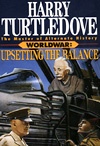 Published by Del Ray, 1996.
Published by Del Ray, 1996.
paperback, $6.99, ISBN: 0-345-40240-5
530 pages.
Upsetting the Balance, the third in the WorldWar series by Harry Turtledove, combines science fiction with World War II into an alternative history fraught with cunning characters, gripping action, perhaps a little too much coincidence, and solid prose. It is a fast and easy read worthy of the resultant sleep deprivation, as Turtledove continues to hone his "Perils of Pauline" style.
Be warned: do not read this third book, or even the second book, Tilting the Balance, unless you read the first book in the series, In the Balance. Like any good soap opera, or in this case, space opera, the characters' actions build upon past activities, and to plunge into the middle of this series without the requisite background is to derail much of the storyline. If you ignore this admonition, know that Turtledove spends hardly any words explaining such previous actions and you are at risk of missing motivations.
During WWII, a fleet of aliens intent upon conquering earth appears in orbit and starts landing troops, tanks, and other weapons of war over the face of the globe. The first two books explain the surprise of "the Race" upon discovering that the medieval warrior images sent back by its probe have turned into carbon-burning tanks, airplanes, and ships. Nevertheless, the invasion proceeds with commendable efficiency, thanks in large part to a technological gap between a starfaring race and a planet-bound one. Still, us "Tosevites" prove remarkably adaptable, resilient, and tenacious in creating an uneasy peace among humans to go fight the aliens.
This alternative history comes at a price--for the actions to occur as written, you have to accept the basic assumptions. After three books, coincidence proves a bit too convenient at times.
There's a few others, but you get the notion.
However, if you accept these as they roll across the pages, and it is very easy to do, then the rest of the storyline will sweep you along as Turtledove follows a dozen or so main characters around the world.
Fictional and Historical Mix
The mix between fictional and historical works well, in large part because the author builds on the perception of historical figures: ruthless Stalin, tightly controlled Molotov, irrational Hitler, defiant Churchill, and so on. You will enjoy following the pairings of fictionald and historical figures, such as the historical commando, Otto Skorzeny, and the fictional panzer leader, Heinrich Jager. Quite possibly the best of this is the interaction between historical and fictional characters in the race to build atomic weaponry--an enchanting mix that brings its own twin aspects of hope and terror.
And you will enjoy the purely fictional characters as well, inluding the WWI vet and minor league coach turned infantry grunt, "Mutt" Daniels, the "experiment" turned partisan, Liu-Han, Fleetlord Atvar, landcruiser driver Ussmak, and even a few lizard prisoners, Ristion, Ullhas, and Teerts.
But that's because the end of every chapter continues the Turtledove tradition of cliffhanging, or if you prefer, leaves you without a solid resolution before bounding off to another character, which was in questionable circumstances last we left him or her. Turtledove is not so much the "master of alternative history" as he is of human psychology--but that does not stop you from reading until your eyes are half shut.
It is a tribute to the pyrotechnics of prose that this series succeeds in print like the movie Independence Day did at the box office. All in all, Upsetting the Balance reels you in. If you are impressed with the first two WorldWar books, you will read this third one, and more than likely, the forthcoming fourth book in the series, Striking the Balance.
This article appears in MagWeb (Magazine Web) on the Internet World Wide Web.
Back to List of Book Reviews: Military Science Fiction
© Copyright 1996 by Coalition Web, Inc.
Other military history articles and gaming articles are available at http://www.magweb.com